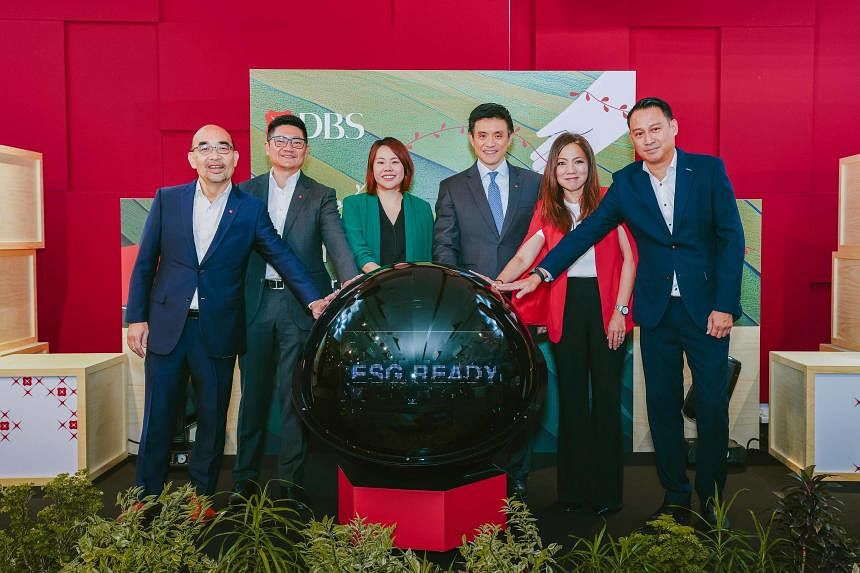SINGAPORE - Local companies will soon be able to join a programme which aims to take the guesswork out of becoming sustainable, through training by specialists, guidance on strategy as well as financing options and assistance.
Launched by DBS Bank and Enterprise Singapore on April 3, the programme will support small and medium-sized enterprises (SMEs) and mid-cap companies by bringing together the bank’s sustainability expertise and its ecosystem of partners.
It will provide foundational training and advisory support to help firms learn about sustainability, and offer them guidance on formulating their strategy, deployment and measurement.
DBS will also provide preferential financing rates to help firms defray the cost of developing and adopting sustainable business practices.
Around 100 companies are expected to join the first cohort of the programme, which was launched in conjunction with DBS’ sustainability day and is expected to start from the second quarter of 2024.
They will gain access to sustainability specialists to guide them on their journeys. These specialists include professional services firm Deloitte and energy management and automation company Schneider Electric.
The participating firms can choose either a basic or intermediate level of training. They will also go through an initial baseline assessment to get an idea of what their carbon footprint is like.
By the end of the programme, the companies should have formulated a clear sustainability action plan, or have even started to implement their decarbonisation strategy.
Enterprise Singapore will also finance 70 per cent of the cost of eligible activities per company till March 31, 2026.
Its managing director Cindy Khoo said in her keynote address: “The impact of climate change will require businesses to start making transitions, making changes to the way they work in order to ensure long-term sustainability and long-term survival.”
She referred to a survey at the start of 2024 by the Singapore Business Federation, which showed that firms have committed to taking action. Three-quarters of businesses have implemented, or plan to implement, initiatives in at least one environmental, social and governance area.
“These are all steps in the right direction. But the survey also found that many businesses are still unclear as to how to start their sustainability journey. This is where we want to come in to help,” she said.
She noted that being sustainable benefits businesses by helping them to be “future-proof” and ensuring long-term viability. This can help firms secure contracts, especially as corporates have started implementing sustainable procurement practices.
“This trend is gaining momentum, not just in Singapore, but globally. Companies that have started on their sustainability journeys will be in a beneficial position by getting a head start when sustainable procurement practices become more widespread,” she said.
Companies can also cut costs when they optimise their use of resources, she added.
“We already felt that with energy shortages and how prices went up. Energy efficiency practices allow companies to hedge against some of these fluctuations,” she said.
Sustainability also helps companies with brand recognition, she noted, adding that there is a growing demand from consumers, corporates and investors for SMEs to become sustainable.
But she also observed that it can be daunting for companies when they lack expertise and are unsure where to start, which is where the programme comes in.
“This includes building awareness on how to start, having expert help to put together a sustainability plan, and eventually, access to financing solutions from DBS to address the costs of becoming more sustainable,” she said.
DBS can provide solutions such as green loans, sustainable trade and supply chain finance, so firms can seize opportunities associated with decarbonisation, for instance.
For local florist Far East Flora, the programme can offer the needed expertise and knowledge to help the firm track the metrics and eventually attain green certifications.
Its assistant group managing director Peter Cheok said a company faces various challenges when it wants to go green. For one, education and a mindset change are vital to convincing the company management that this is a necessary step. “It’s not just a matter of environmental requirements... but we have to look beyond that to willingly do more,” he said.
He added that regulations can be wide and ever-evolving, so firms need help to know what frameworks to follow. Far East Flora also does not yet have a chief sustainability officer, but this might be a needed resource in the future, he added.
For Tai Sin Electric, one of the main hurdles it encountered was the task of data collection and management.
Its head of marketing and group corporate development Willy Chua said: “We grappled with the complexities of aligning our operations with sustainable practices... We believe that greater guidance and access to grants would have better equipped us as an SME to navigate this journey with more confidence and structure.”
DBS group head of corporate and SME banking Koh Kar Siong said: “The transition to a low-carbon economy can be complex for smaller businesses due to constraints such as the lack of resources, time, expertise and funds. It is imperative that we provide companies with the necessary support to integrate sustainability into their business operations.”


